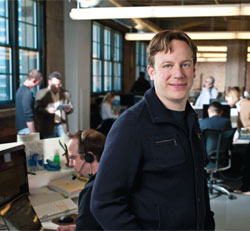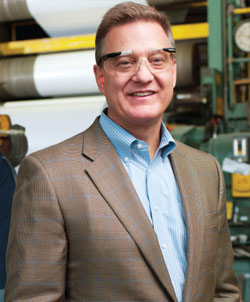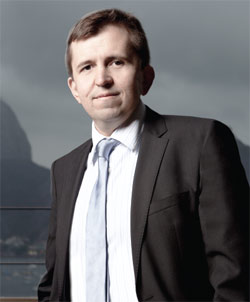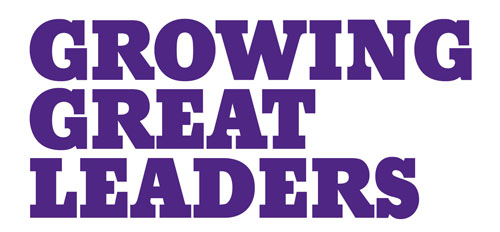Not everyone manages like a Kellogg grad. Learn how Sheelah Muhammad '95 and other alumni are building organizations that are strong, sustainable and globally significant
By Amy Trang
 |
|
| Adam Caplan '01 Photo by Tom Maday |
|
Adam Caplan '01 was feeling elated.
Caplan, the founder and CEO of Chicago-based Model Metrics, had just wrapped up a meeting with chief information officers from around the nation about his company's increasing presence in the cloud-computing industry. It was hard to believe, Caplan thought, that his company had come so far: from its origins as a one-man operation to a leading consulting firm with 500-plus clients, including Abbott, Boeing, L'Oreal and NBC Universal.
Caplan reached into his pocket and pulled out his iPhone. He logged in to Chatter — an internal social network for Model Metrics — and posted the outcome of the meeting for his 150 employees to see. Within hours, the message received dozens of "likes" from everyone from interns to senior executives.
"We're very open and transparent with our employees," explains Caplan. At Model Metrics, "we share everything with everyone in the company, from financials to vision to strategy, the good stuff and the bad stuff."
This leadership style is something that Caplan learned at Kellogg — and he's not alone. Across the globe, alumni are leveraging their Kellogg experience to lead teams in innovative and effective ways. Kellogg laid the foundation, these alumni say, to make bold decisions and build organizations that are strong, sustainable and globally significant.
Here are just a few of their stories.
Transparent leadership
When Caplan was developing a business plan for Model Metrics, he envisioned a technology consulting company that focused on being the best and most innovative in the industry. He also wanted to create a firm where employees wanted to work.
"It was about, 'How can we create a unique, differentiated company?'" explains Caplan. "We wanted to attract talent, retain talent and build an amazing brand [so] we could win in the marketplace."
To that end, Caplan worked to create a unique company culture that prioritized both client success and employee satisfaction. To meet the latter goal, he kept employee travel in check, gave his staff the option to telecommute, created an open office environment that encouraged collaboration, and focused on bleeding-edge technologies to incite passion and excitement internally. Caplan's plan worked: In 2010, Model Metrics was named the "No. 1 Top Workplace for under 250 employees" by the Chicago Tribune. Employee retention rates at the company are currently above 95 percent.
As Caplan believed, an exceptional workplace has translated into significant business wins for Model Metrics. For example, in 2008, Model Metrics created a mobile application that was among the first 500 featured in Apple's App store — a coveted position in this highly competitive market. And since its founding in 2003, Model Metrics has had 80 percent year-over-year revenue growth. In May, Caplan was named CEO of the Year by the Illinois Technology Association for the firm's "extraordinary business growth" over the previous year and was honored with the Kellogg Alumni Rising Entrepreneur of the Year Award.
Throughout this growth period, transparency has remained a priority for Caplan. He holds biweekly, company-wide meetings in which the executive team shares market data to explain the reasoning behind big changes at Model Metrics — such as directing all of the company's research and development dollars to mobile applications.
"We try to make sure that everyone knows that every client interaction and every single prospect interaction reflects our brand," says Caplan.
"The openness, visibility and transparency of leadership was a big message at Kellogg," he continues. "If [your employees] are dialed in on the message — and have great experiences — at the office, then they will do better client work. They will become evangelists for the company."
 |
|
| Mark Richards '89 Photo by Tom Maday |
|
A vision for change
Mark Richards '89 faced tough challenges.
Newly appointed to the helm of Appleton Papers, Richards was the first CEO in the company's 100-year history chosen from outside the firm or its parent companies. To Appleton employees — especially those who had spent their whole careers at the Wisconsin-based firm — Richards was an unknown leader who needed to earn their trust while charting Appleton's future.
To further complicate matters, demand for the company's primary product, carbonless paper, was in decline. Efforts to diversify Appleton's product offerings hadn't been as successful as the company had hoped.
Recalling lessons learned at Kellogg, Richards realized that he needed to "connect the future to a vision and [answer employees' question] of 'What does it mean for me?'" he says. "Kellogg taught me how to set plans, how to hold people accountable and how to drive results."
Thus began a series of bold moves. Richards assembled a diverse leadership team that combined the "best and the brightest" from the paper industry. He set a new vision for Appleton, introducing four strategic platforms and insisting that the company narrow its market focus — and strive to be No. 1 or No. 2 in those markets. He directed a $125-million investment in manufacturing equipment for Appleton's growing thermal business.
To better connect with his team, Richards visited the factory floor, talking to employees about their personal lives and gathering their perspectives on the future of the company. He conducted town-hall meetings, hosted informational lunches and sent out "Richards' Report" e-newsletters to keep every member of the team abreast of changes within the company.
"Mark bought clarity and a strong focus to everyone's job," recalls Bill Van Den Brandt, manager of corporate communications and a 23-year Appleton employee. "People became more engaged because they recognized that what they did tied directly to the company's success."
But in 2008, just as Appleton was finding its footing, the recession hit.
To protect the company, Richards and his executive team had to make hard decisions surrounding budget cuts, layoffs, pay freezes, furloughs, restricted work schedules and production curtailments.
"Like many companies, we became more internally focused as a way to survive the recession," Richards says. "But we also relied on the talent, creativity and teamwork of our people to strengthen our market leadership positions. And we never lost faith in our vision or in our passion for serving customers."
Once again, Richard's hard work paid off: Since the third quarter of 2010, Appleton has delivered three consecutive quarters of improved operating performances. It continues to build momentum today.
 |
|
| Arlindo Eira Filho '04 Photo by Tom Maday |
|
Building a united front
Armed with a Kellogg MBA and a Harvard law degree, Brazilian native Arlindo Eira Filho '04 returned to his home country with one goal in mind: to help Brazil become an economic competitor on the global stage.
But Eira Filho knew that having this vision wasn't enough. If he wanted to ignite change in the country, he needed to convince others to believe in — and get behind — this audacious goal.
Eira Filho found an opportunity to do just that at McKinsey & Company's São Paulo-based office. As he progressed from associate to associate principal, he began leading small teams on consulting projects. In particular, he was charged with managing projects that improved infrastructure and government capital spending in Brazil.
One of those projects involved a massive, seven-month research study of Brazil's airport infrastructure and its capabilities for meeting passenger-traffic demand. The study, financed by Brazil's National Development Bank (BNDES), focused on projected demand during the 2014 FIFA World Cup Brazil and 2016 Summer Olympics in Rio de Janeiro, when millions of people worldwide are expected to pass through airports in Brazil.
To address this challenge, Eira Filho focused on breaking down walls between his clients and team members so they formed a united front with a common vision. It's a notion he learned at Kellogg.
"Kellogg teaches you about uniting people," Eira Filho continues. "You would not be successful at Kellogg if you told people what to do. [Your fellow students] were your peers, not your subordinates."
Eira Filho and his team discovered that Brazil needed to invest approximately $19 billion in its airports to meet traffic demand by 2030. The team made several recommendations, including moving civil aviation responsibilities to the Ministry of Transport, defining and monitoring clear metrics for aviation-sector players, and providing ways to increase private-sector participation in the airport industry.
Based on McKinsey's recommendations, the government created a Special Secretariat position to oversee civil aviation responsibilities that reports directly to the Office of the President. In addition, immigration, customs and agriculture operations are starting to be coordinated centrally by an airport authority, similar to that found in U.S. airports.
Besides improving productivity for the country, air travel is a "consumption dream" for many Brazilians, Eira Filho says. As the country gets richer, many people will ascend to the middle classes and experience air travel for the first time.
"I used to think that, to be a leader, you had to be a politician or an entrepreneur," says Eira Filho. "But we can be leaders by helping people make better decisions that improve their organizations."
 |
|
| Sheelah Muhammad '95 Photo by Tom Maday |
|
The power of empowerment
Growing up in the 1970s, Sheelah Muhammad '95 watched her father, a grocery-store owner, deliver produce to Chicago neighborhoods where access to fresh, healthy food was severely limited.
Muhammad realized that "where you live determines how you live," she explains. "It plays so much into your health, your quality of life and your well-being. It's all connected."
Following in her father's footsteps, Muhammad has devoted her professional career to helping, leading and — most importantly — empowering underserved communities to improve their quality of life. From working in community finance at Bank of America, to serving as a program officer for Oprah's Angel Network, to launching the "Fresh Moves" mobile produce market, Muhammad is committed to "leading in ways that are going to benefit society — whether it's at the individual, family or community level," she explains. "And leading without leaving people behind."
"You don't want people to just buy into your ideas," she explains. "You want to empower them to create their own vision for their community. You may have an idea of what you think is right, but you have to understand from others' perspective what will work best for them."
That philosophy served Muhammad well in 2005, when Oprah's Angel Network charged her with helping hundreds of families displaced by Hurricane Katrina. Rather than dictate details surrounding the families' relocation, Muhammad organized community meetings so that families could talk about their shared values — and ways to integrate those values into their new communities in Texas, Louisiana, Mississippi and Alabama. Collectively, hurricane-survivor families in Houston decided to build a community center that will feature Creole cooking classes, a mosaic of the New Orleans landscape and furniture made out of wood salvaged from the city.
Similarly, as co-founder of Fresh Moves, Muhammad does more than just deliver fruit and vegetables to low-income areas of Chicago. She has partnered with local organizations, such as churches, schools and health clinics, to start a community-wide dialogue and participation in the healthy foods movement.
She learned these leadership values, she notes, at the Kellogg School. "Working in teams was a part of the culture at Kellogg," she says. "It made me understand the value of collaboration and the importance of involving people at all levels. You have to find ways to involve and empower people."



